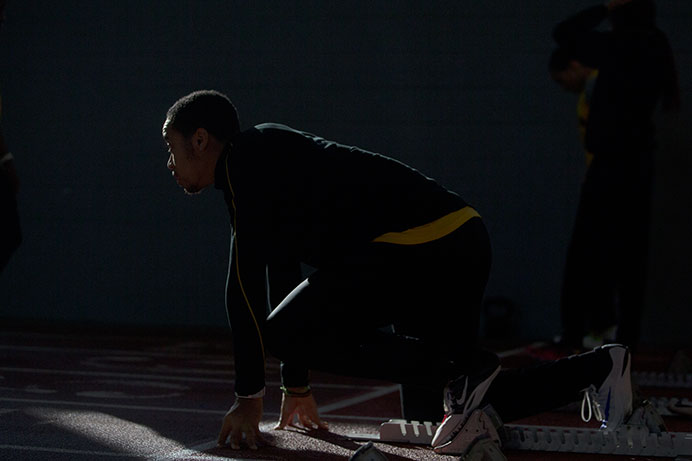All track athletes have their strongest areas in competition, their areas in which they thrive the most. However, sometimes coaches change things up, and the results can be surprising.
Michael Melchert, one of the top distance runners on the Iowa men’s track team, came into the season as one of the Hawkeyes’ dominant 3,000-meter runners. When competing at the Big Four Duals on Jan. 23, his coaches put him in the mile, an event they knew he could perform well in — they just didn’t foresee how well.
Melchert ran the mile in 4:05.37. While he finished third, the sophomore jumped into the Iowa record books; his time ranks fourth all-time for the Hawks.
“Being fourth all-time at Iowa is a tremendous honor, and I hope to keep moving up throughout my career here,” he said.
Coach Layne Anderson believed that even if Melchert couldn’t stay with the front of the pack, he would still be able to post a good time.
While Melchert ran a fast first 800 meters, the best was yet to come. Anderson noted that Melchert ran close to a two-minute 800 to close out the race.
“I’ve always had some natural speed, so in the mile I just try to stay relaxed with the leaders for around 1,000 meters and then kick the last 600 meters,” Melchert said. “Coach Wiz [Iowa’s former cross-country coach] and Coach Anderson always say strength is speed, and in order to obtain a good amount of strength as a distance runner, you need to have a good cross-country season. The strength from cross-country has given me tremendous confidence for track.”
Iowa Director of Track and Field Joey Woody attributes Melchert’s success to the distance runners’ training.
“Obviously, he was not really training for [the mile], but it was exciting to see [his performance],” Woody said. “It’s a good sign of where things are going in his training.”
This led the coaches to rethink the idea that Melchert can only be a 3,000-meter runner.
“Going into this weekend, we thought that,” Anderson said. “[Melchert is] learning, I’m learning. Instead of a 3K runner only, I think he realizes, and we see, that he’s going be a great all-around runner, be able to do a variety of things. That’s never a bad place to be.”
With this versatility, fans should look for Melchert to occasionally run outside his traditional 3,000 meters. His flexibility in events gives the coaches the option to insert him into whatever lineup they see benefiting the team the most, whether in the mile or a longer distance.
Only in the beginning of his second indoor season, coaches see Melchert as a leader, setting an example for others in the program.
“Those performances [such as that of Jan. 23] are enlightening to everybody,”Anderson said. “It’s inspiring to not just distance runners but the track team as a whole.”
While this affects his teammates, Melchert acknowledged that his confidence has grown, but he does not want to think ahead too far.
“It gives me tremendous confidence,” he said. “But having one good race doesn’t mean they are all going to be good. I still have to keep the same mindset and focus.”



